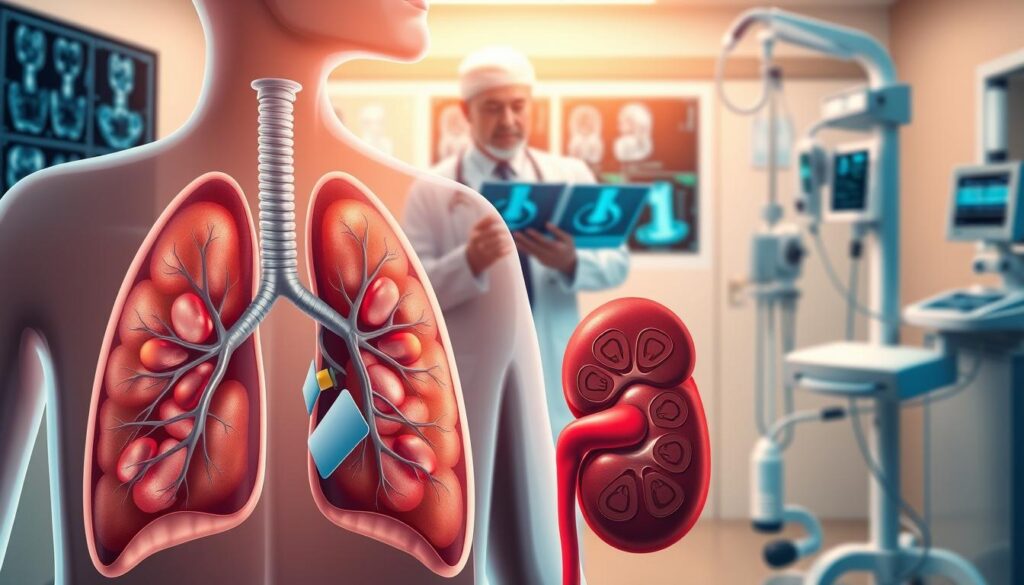As people age, managing long-term conditions becomes a key part of maintaining well-being. Research shows over 94% of adults aged 60+ live with at least one chronic disease, according to data from the National Council on Aging. These challenges often include heart disease, Alzheimer’s, and diabetes—conditions that require ongoing care and awareness.
Understanding these age-related concerns helps families and caregivers support loved ones better. For example, high blood pressure affects nearly half of older Americans, while chronic obstructive pulmonary disease (COPD) impacts millions. Early detection and lifestyle adjustments can dramatically improve daily life for those affected.
This article explores major chronic diseases, backed by insights from the CDC and CMS. You’ll learn how prevention strategies and timely interventions can reduce risks. We’ll also discuss practical steps to enhance quality of life through better management of these conditions.
Key Takeaways
- Over 94% of adults over 60 have at least one chronic condition.
- Heart disease, Alzheimer’s, and diabetes rank among the top concerns.
- High blood pressure and COPD are widespread in older populations.
- Data from trusted sources like the CDC highlights prevention opportunities.
- Early action and lifestyle changes can improve long-term outcomes.
Introduction to Elderly Health Concerns
Prioritizing wellness in later years lays the foundation for independence and vitality. Nearly 60% of adults over 65 manage hypertension, while 1 in 8 face Alzheimer’s disease. Addressing these challenges early helps preserve physical mobility and mental sharpness.
Why Proactive Care Makes a Difference
Staying ahead of potential concerns allows older individuals to maintain hobbies, relationships, and daily routines. Simple actions like monitoring blood pressure or choosing a healthy diet can prevent complications. Research shows those who address high cholesterol early reduce heart disease risks by 27%.
Key Influences on Long-Term Wellness
Three primary factors shape senior wellness:
- Genetic history: Family patterns of diabetes or dementia
- Daily habits: Exercise frequency and food choices
- Environmental triggers: Air quality or access to fresh foods
Unmanaged high blood pressure strains organs over time, while poor nutrition accelerates cognitive decline. Maintaining a healthy weight through balanced meals and activity strengthens defenses against these threats. Later sections will explore practical strategies for specific conditions like Alzheimer’s disease and circulatory concerns.
Identifying Common Elderly Health Issues
Navigating later-life wellness requires awareness of persistent physical and cognitive challenges. Over 95% of adults aged 65+ live with at least one chronic condition, according to the National Council on Aging. These ongoing concerns demand tailored strategies to preserve quality of life.
Chronic Conditions Impacting Older Adults
Respiratory challenges like chronic obstructive pulmonary disease (COPD) affect 1 in 7 adults over 65. This umbrella term includes chronic bronchitis and emphysema, which progressively limit lung function. Early symptom recognition—such as persistent coughing or shortness of breath—helps slow progression through medication and lifestyle changes.
Mental Health and Cognitive Challenges
Memory lapses and mood changes often accompany aging. Depression impacts 15% of older individuals, while cognitive decline affects 1 in 9. Proactive measures like social engagement and brain-stimulating activities can strengthen mental resilience. Regular check-ups play a vital role in detecting subtle changes early.
Three steps improve outcomes for these challenges:
- Routine screenings for lung function and cognitive performance
- Personalized care plans combining medication and therapy
- Support networks to encourage consistent treatment adherence
Heart Health and Cardiovascular Concerns
Maintaining a strong cardiovascular system becomes increasingly vital as individuals grow older. According to the CDC, cardiovascular diseases account for over 40% of deaths in adults over 65. High blood pressure alone affects nearly 70% of seniors, often silently damaging arteries before symptoms appear.
Understanding High Blood Pressure and Its Impact
When blood pushes too forcefully against artery walls, it strains the heart and raises stroke risks. Over time, this can lead to thickened arteries or kidney damage. A diet high in sodium and low in potassium often contributes to this imbalance.
Simple swaps—like choosing fresh vegetables over canned soups—can lower readings by up to 11%. Regular monitoring helps catch fluctuations early, especially for those with diabetes, which doubles heart disease risks.
Ischemic Heart Disease and Prevention Strategies
This condition develops when plaque narrows coronary arteries, limiting oxygen-rich blood flow. Chest pain during activity is a key warning sign. Studies show losing just 5-10% of body weight improves circulation in 83% of cases.
Three approaches reduce risks effectively:
- Activity: Walking 30 minutes daily strengthens heart muscles
- Diet: Omega-3-rich foods like salmon combat inflammation
- Monitoring: Annual stress tests detect blockages early
Medications like statins, combined with these habits, can lower heart attack risks by 36%.
Respiratory and Kidney Disorders

Breathing difficulties and kidney function decline demand attention as individuals grow older. Nearly 25% of adults over 65 live with chronic kidney disease, while COPD affects 1 in 7 in this age group. These conditions often overlap—reduced lung capacity strains the heart, and kidney dysfunction raises blood pressure risks.
Managing COPD, Emphysema, and Chronic Bronchitis
COPD symptoms like wheezing worsen with age, making routine tasks exhausting. Women face higher hospitalization rates for severe flare-ups, partly due to smaller airway structures. Quitting smoking cuts progression risks by half within five years.
Pulmonary rehab programs combining exercise and education improve stamina. Regular spirometry tests track lung changes, allowing timely treatment tweaks.
Chronic Kidney Disease Insights
Kidneys filter less efficiently after age 60, increasing vulnerability to toxins. Uncontrolled high blood pressure accelerates damage—30% of cases link directly to hypertension. Maintaining a healthy weight through portion control eases organ strain.
Three strategies protect kidney function:
- Hydration: 6-8 glasses daily flush waste products
- Diet: Limit processed meats to reduce protein leakage
- Monitoring: Annual creatinine tests spot early decline
Those with diabetes should check blood sugar levels daily, as spikes harm delicate kidney tissues over time.
Diabetes, Obesity, and Metabolic Issues
Metabolic changes often fly under the radar until symptoms emerge. Over 27% of adults aged 65+ live with diabetes, while obesity affects 41% in this group. These intertwined conditions amplify risks for heart diseases and complicate daily care routines.
Preventing Diabetes and Regulating Blood Sugar
Balanced meals rich in fiber and lean proteins help stabilize glucose spikes. Swapping sugary snacks for nuts or Greek yogurt can lower A1C levels by 0.5% within months. Pairing diet changes with 150 minutes of weekly exercise—like brisk walking—boosts insulin sensitivity.
Continuous glucose monitors now provide real-time data, empowering individuals to adjust meals and activities. Medications like metformin remain key in treatment plans, but lifestyle shifts reduce reliance on prescriptions by 22%.
Tips for Maintaining a Healthy Weight
Portion control proves more effective than restrictive eating. Using smaller plates and prioritizing vegetables first creates sustainable habits. Strength training twice weekly preserves muscle mass, which burns calories even at rest.
High cholesterol often accompanies weight struggles. Foods like oatmeal and avocados improve lipid profiles while keeping hunger in check. Tracking progress through weekly weigh-ins—not daily fluctuations—builds motivation without frustration.
These adjustments don’t just manage weight. They create a protective shield against metabolic diseases, letting individuals enjoy favorite activities longer.
Cognitive and Mental Health Challenges

Aging brings unique challenges to brain health and emotional resilience. Over 12% of Medicare recipients live with Alzheimer’s disease, while 16% experience depression. Recognizing these patterns early helps families and caregivers provide better support.
Alzheimer’s Disease and Dementia Overview
Memory loss often starts subtly—misplacing keys or forgetting names. Over time, these changes can progress to confusion with daily tasks. Research links excessive alcohol use to faster cognitive decline, especially after age 65.
Those who’ve had a stroke face triple the risk of developing dementia. Engaging in puzzles or learning new skills strengthens neural connections. Regular cognitive screenings catch concerns early, when interventions work best.
Addressing Depression and Emotional Well-Being
Feelings of loss—whether independence or loved ones—can trigger depression. Staying socially active through clubs or volunteering counteracts isolation. Limit alcohol, as it worsens mood swings over time.
Three strategies boost emotional resilience:
- Morning sunlight exposure to regulate sleep cycles
- 15-minute daily journaling to process emotions
- Quarterly mental health check-ups
Adapting to life changes—like retirement or moving—becomes easier with strong support networks. Families play a key role in encouraging treatment plans that improve quality of life through the years.
Lifestyle Modifications for Disease Prevention
Small daily choices create powerful shields against chronic conditions. Combining smarter nutrition, movement, and proactive care helps manage risks linked to emphysema, bronchitis, and other persistent concerns. Studies show consistent lifestyle adjustments can delay disease progression by up to 15 years.
Fueling Wellness Through Diet and Activity
Swapping sugary drinks for herbal tea cuts empty calories while reducing inflammation. Adding fiber-rich foods like lentils improves digestion and stabilizes blood sugar. For those managing respiratory issues, antioxidant-packed berries combat lung stress caused by pollutants.
Daily walks strengthen heart muscles and lung capacity—critical for bronchitis recovery. Even 20 minutes of gentle yoga enhances circulation and joint flexibility. Pairing activity with balanced meals amplifies benefits, creating a ripple effect across bodily systems.
Staying Ahead With Screenings and Smart Habits
Annual screenings catch concerns like elevated blood sugar before complications arise. Spirometry tests track lung function for those with emphysema, guiding treatment adjustments. Medications work best when paired with lifestyle tweaks—like taking blood pressure pills with low-sodium meals.
Three steps enhance prevention efforts:
- Track symptoms using apps to share real-time data with doctors
- Limit alcohol to 1 drink daily to protect liver and metabolic health
- Attend community fitness classes for motivation and social support
These strategies don’t just add years to life—they add life to years by preserving independence and joy.
Conclusion
Taking charge of well-being in later years starts with knowledge and action. Heart disease, diabetes, and respiratory challenges remain top concerns for many, but early detection and lifestyle shifts can reshape outcomes. Regular screenings—like blood pressure checks and cognitive assessments—help spot changes before they escalate.
Adopting preventive steps such as balanced meals and consistent activity strengthens defenses against chronic conditions. Pairing these habits with prescribed treatments ensures better disease control and prevention. Studies show those who track symptoms and attend check-ups reduce hospitalization risks by 33%.
Simple strategies make a difference. Staying socially engaged preserves mental sharpness, while quitting smoking improves lung capacity within months. Explore preventive measures tailored to your needs, like calcium-rich diets or stress-reducing walks.
Share this knowledge with family—proactive care isn’t solitary work. Together, small changes build resilience, letting you savor life’s moments with confidence and vitality.


